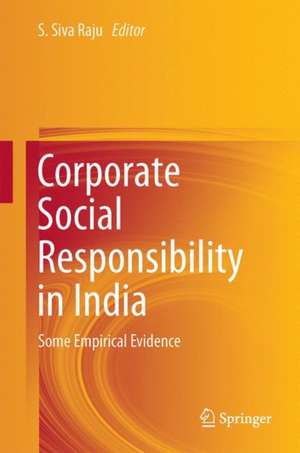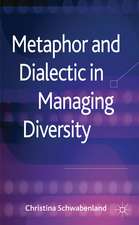Corporate Social Responsibility in India: Some Empirical Evidence
Editat de S. Siva Rajuen Limba Engleză Hardback – 2 noi 2017
CSR is a rapidly growing area of research and activity, especially in developing countries like India. An increasing number of companies are realizing their own social responsibility, given that they work within societal networks. As a result, any initiation or expansion activity they carry out in society impacts the communities around them. Given the newness of the field, the work on CSR in India is still in the initial stages. Most importantly, there is a need to highlight issues concerning CSR activities using sound methodologies and scientific data. A database comprising qualitative and quantitative approaches collected by tracking CSR activities isinvaluable. Further the scientific data is vital to fully understand CSR, and in turn helps in designing appropriate and effective interventions for improving community members’ quality of life. Accordingly, the stakeholders associated with CSR need to have a sound knowledge of how to conduct studies related to baseline data generation, community needs assessments, community profiling, stakeholder mapping, social impact assessments, monitoring and evaluation, as well as the social auditing of CSR projects and other related issues. This book aptly covers these issues and offers supporting empirical evidences from the field.
| Toate formatele și edițiile | Preț | Express |
|---|---|---|
| Paperback (1) | 636.12 lei 6-8 săpt. | |
| Springer Nature Singapore – 23 mai 2018 | 636.12 lei 6-8 săpt. | |
| Hardback (1) | 642.36 lei 6-8 săpt. | |
| Springer Nature Singapore – 2 noi 2017 | 642.36 lei 6-8 săpt. |
Preț: 642.36 lei
Preț vechi: 755.72 lei
-15% Nou
Puncte Express: 964
Preț estimativ în valută:
122.93€ • 133.48$ • 103.26£
122.93€ • 133.48$ • 103.26£
Carte tipărită la comandă
Livrare economică 22 aprilie-06 mai
Preluare comenzi: 021 569.72.76
Specificații
ISBN-13: 9789811039010
ISBN-10: 9811039011
Pagini: 192
Ilustrații: XIII, 194 p. 55 illus.
Dimensiuni: 155 x 235 mm
Greutate: 0.47 kg
Ediția:1st ed. 2017
Editura: Springer Nature Singapore
Colecția Springer
Locul publicării:Singapore, Singapore
ISBN-10: 9811039011
Pagini: 192
Ilustrații: XIII, 194 p. 55 illus.
Dimensiuni: 155 x 235 mm
Greutate: 0.47 kg
Ediția:1st ed. 2017
Editura: Springer Nature Singapore
Colecția Springer
Locul publicării:Singapore, Singapore
Cuprins
Chapter 1. Profiling of the communities.- Chapter 2. Baseline surveys.- Chapter 3. Community need assessment.- Chapter 4. Social impact assessment.- Chapter 5. Stakeholder mapping.- Chapter 6. Social auditing.- Chapter 7. M & E of developmental projects.- Chapter 8. CSR indices.- Chapter 9. Public-Private Partnership models.- Chapter 10. Practitioner perspectives on CSR.- Chapter 11. Models of CSR: A few case studies.- Chapter 12. CSR and sustainable development: A case of solid waste management.- Chapter 13. CSR and skill development: A case of vocational training centre.
Notă biografică
S. Siva Raju is Deputy Director, Hyderabad Campus, Tata Institute of Social Sciences (TISS) and Professor at the Centre for Population, Health and Development, School of Development Studies, TISS, Mumbai. His broad fields of professional interest are corporate social responsibility, resettlement and rehabilitation, ageing, health and development. His major publications include: Implementing Corporate Social Responsibility (co-ed., Springer, 2014), Regional Development & Family Planning (Daya Publishing House, 1987), Social Inclusion and Women Health: Perspectives and Issues (co-ed., Indian Association for Social Science and Health, 2013), Ageing, Health and Development (co-ed., B.R. Publishing Corporation, 2013), Gerontological Social Work in India: Some Issues and Perspectives (co-ed., B.R. Publishing Corporation, 2000), Health Status of the Urban Elderly: A Medico-Social Study (B.R. Publishing Corporation, 2002), Adolescents Reproductive Health Perspectives (co-ed., B.R. Publishing Corporation, 2006), Voice of the Elderly in India (B.R. Publishing Corporation, 2011), Primary Health Centres in Rural Health (co-ed., B.R. Publishing Corporation, 2013), Networking of Organizations Working for Care of Older Persons in Mumbai: Issues and Implications (Family Welfare Agency, Mumbai/ B.R. Publishing Corporation, 2002) and a study on elderly Parsis in India, funded by PARZOR Foundation. He has prepared a Status Report on the older poor in India, which was presented at the Second World Assembly on Ageing by the United Nations. He is an Honorary Director of the International Longevity Centre, Pune and co-ordinator of the United Nations Population Fund (UNFPA) Initiative on, 'Building Knowledge Base on Population Ageing in India'.
Textul de pe ultima copertă
This book presents the authors’ recent field experiences of corporate social responsibility (CSR) activities in different regions of India. It also demonstrates how social auditing and stakeholder mapping help analyze the impact that particular individuals or groups may have on the functioning of any company in an area.
CSR is a rapidly growing area of research and activity, especially in developing countries like India. An increasing number of companies are realizing their own social responsibility, given that they work within societal networks. As a result, any initiation or expansion activity they carry out in society impacts the communities around them. Given the newness of the field, the work on CSR in India is still in the initial stages. Most importantly, there is a need to highlight issues concerning CSR activities using sound methodologies and scientific data. A database comprising qualitative and quantitative approaches collected by tracking CSR activities is invaluable. Further the scientific data is vital to fully understand CSR, and in turn helps in designing appropriate and effective interventions for improving community members’ quality of life. Accordingly, the stakeholders associated with CSR need to have a sound knowledge of how to conduct studies related to baseline data generation, community needs assessments, community profiling, stakeholder mapping, social impact assessments, monitoring and evaluation, as well as the social auditing of CSR projects and other related issues. This book aptly covers these issues and offers supporting empirical evidences from the field.
CSR is a rapidly growing area of research and activity, especially in developing countries like India. An increasing number of companies are realizing their own social responsibility, given that they work within societal networks. As a result, any initiation or expansion activity they carry out in society impacts the communities around them. Given the newness of the field, the work on CSR in India is still in the initial stages. Most importantly, there is a need to highlight issues concerning CSR activities using sound methodologies and scientific data. A database comprising qualitative and quantitative approaches collected by tracking CSR activities is invaluable. Further the scientific data is vital to fully understand CSR, and in turn helps in designing appropriate and effective interventions for improving community members’ quality of life. Accordingly, the stakeholders associated with CSR need to have a sound knowledge of how to conduct studies related to baseline data generation, community needs assessments, community profiling, stakeholder mapping, social impact assessments, monitoring and evaluation, as well as the social auditing of CSR projects and other related issues. This book aptly covers these issues and offers supporting empirical evidences from the field.
Caracteristici
Highlights issues concerning CSR activities, combined with sound methodologies, scientific data and field observations Demonstrates how social auditing and social impact assessment help to analyze the impact that particular individuals or groups may have on the functioning of companies in an area Introduces various tools and techniques that exist in the field of CSR and discusses their appropriate usefulness for adoption in different socio-economic settings Discusses various CSR projects with regard to public-private partnership models, sustainable development, and skill development Includes supplementary material: sn.pub/extras












